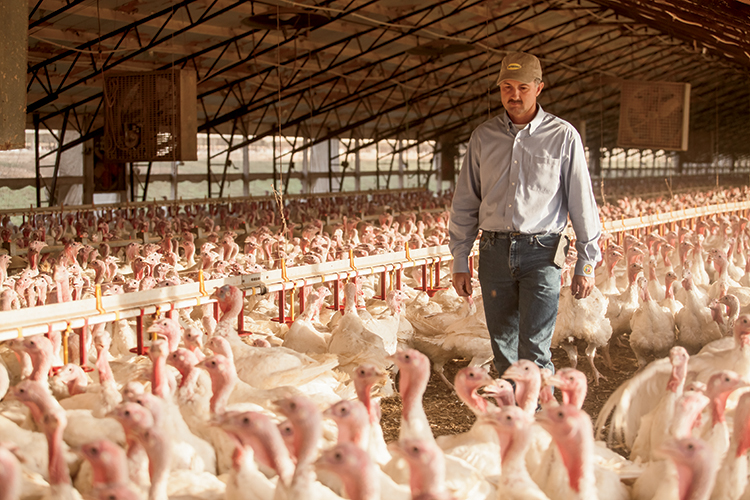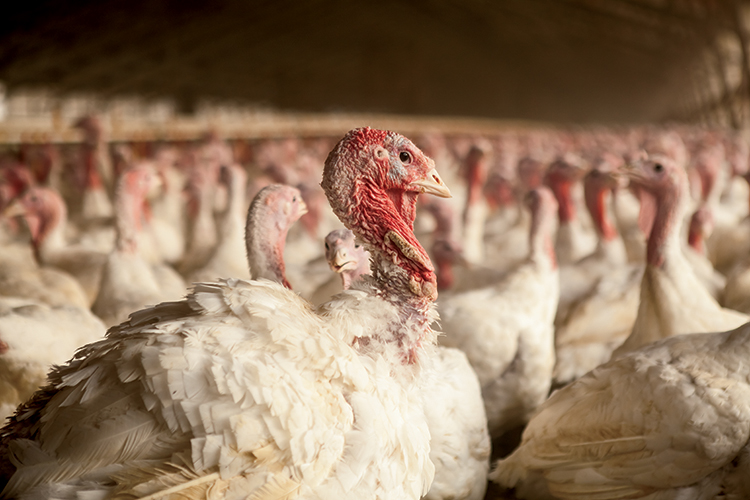Home > Arkansas > Arkansas Crops & Livestock > Passionate About Poultry
Passionate About Poultry

Ranking as Arkansas’s eighth agricultural commodity and third in total U.S. production, turkeys are more than just a Thanksgiving Day affair. With the number of health-conscious consumers on the rise, Arkansas’s turkey industry is prepared to meet increasing demands, and here’s why.
Raised In Arkansas
Raising turkeys in Arkansas certainly has its advantages – temperate climate, proximity to the Grain Belt and a location that allows strategic access to coastal markets – but what tops this list is the farmers.
“The critical part in growing good turkeys is having good farmers who care about our birds and are dedicated to good animal husbandry. Arkansas has definitely provided that,” says David Anderson, vice president of Live Operations at Butterball LLC, which contracts more than 200 turkey farmers and employs about 1,345 in Arkansas.
“Every Butterball-branded whole turkey is produced in Arkansas,” adds Stephanie Llorente, public relations manager for the firm. “So if you have a Butterball turkey on your table at Thanksgiving, it’s from Arkansas.”
While this fact makes the state’s turkey farmers proud, Butterball’s sales also have a statewide economic impact estimated at $72.9 million.
Similarly, one of the largest turkey businesses in the United States has found a niche in Arkansas.
“Approximately 1,400 people, 90 percent of Cargill’s employees in Arkansas, are in the company’s turkey business,” says Shane Acosta, complex general manager for Cargill, a global agribusiness company.
Providing jobs and a stable income for farmers is another important economic impact the industry has on Arkansas.
“Even though it’s a lot of hard work and long hours, this is our business and commitment,” attest Jeff and Gloria Lindsey, who raise around 53,000 turkeys on their farm for Cargill. Like many dedicated turkey farmers in the state, the couple always looks forward to raising the next best flock.

Technology And Education
In recent years, innovation in equipment and technology has transformed the state’s turkey industry.
“The biggest technology changes are around ventilation equipment: fans, foggers, evaporative cooling pads and computerized controllers,” says Anderson. “Our trucks have air conditioners, heaters, humidifiers and a backup generator. Activity is also monitored while in transit.”
These new technologies, combined with continued education, are the cornerstone for the industry’s success. “Computer systems make it easier, but it still requires the farmer,” agree the Lindseys, who have become certified in order to provide the best care possible for their birds.
Animal Walfare And Husbandry
Butterball and Cargill place animal welfare as a top priority. This commitment is passed down to the farmer.
“Our poultry operation probably lives better than we do,” joke the Lindseys. “You want the poultry to be as comfortable as possible; that’s what we strive to do.”
Todd Bradbury, a turkey farmer for Butterball, has been raising turkeys for 22 years. Today, he cares for approximately 93,000 birds using a new single age growing method that helps minimize disease.
“I can tell a big difference in turkey performance,” he says. “This changeover is a huge positive,” confirms Anderson. “It’s better for our birds, because it’s a healthier environment and we’re seeing that in the results, which means more payment to our farmers.”
Looking To The Future
“There is a new initiative to increase per capita turkey consumption to 20 pounds per person by 2020,” explains Acosta. “As per capita consumption increases, it should increase turkey production in Arkansas and across the industry.”



